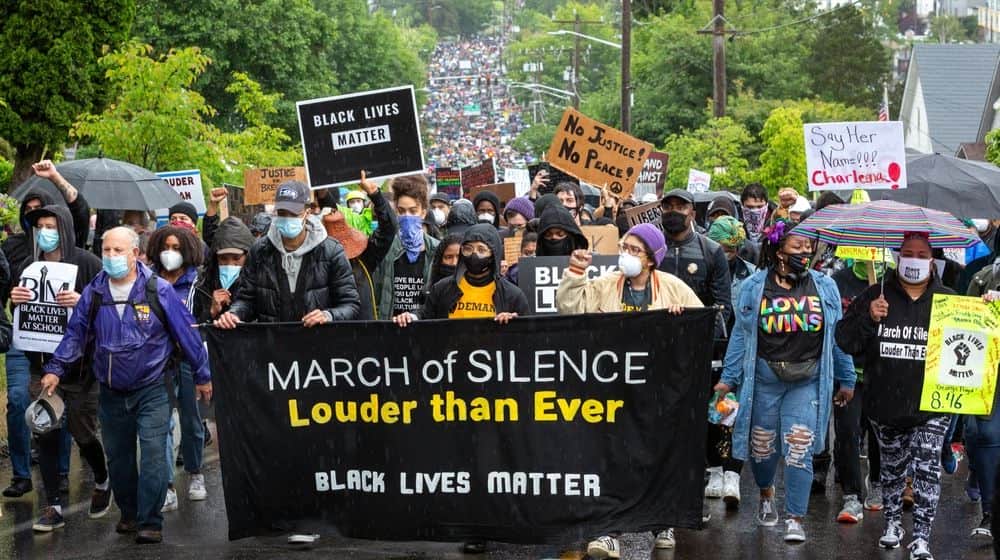US News
Thousands March in Seattle — in Silence — to Show Support of Black Lives

Jun. 13–Thousands filled Seattle's Judkins Park on Friday afternoon to march up Beacon Hill to Jefferson Park — in silence.
“The world is watching,” Ebony Miranda, chair of the organizing group, Black Lives Matter Seattle-King County, told marchers, “let our silence speak volumes.”
The chapter estimated that 60,000 people took part in the 1.8-mile March of Silence Friday afternoon. That turnout, though difficult to verify, would make the march the largest in the Seattle area since George Floyd's death. Marchers filled Judkins Park and playfield at the beginning, and more joined from surrounding streets — and many, upon arrival at the end of the march in Beacon Hill, left before the rest of the marchers arrived.
Smaller marches were held in West Seattle and in several other cities, including Issaquah, Everett and Renton.
The March of Silence organizers, whose chapter of Black Lives Matter sued Seattle Mayor Jenny Durkan and police Chief Carmen Best for the Police Department's treatment of protesters, has outlined its demands to the city, county and state: They include cutting at least $100 million from SPD's budget, closing the new youth detention center in King County, ending cash bail statewide and declaring racism a public health crisis.
“We have to look up now and tell 'em we're not having it any more!” said the event's first speaker, Dominique Davis, who runs Community Passageways, a nonprofit that helps Black and brown people in court cases.
Friday marked two weeks since the first protests broke out in Seattle over the death of Floyd, a Black man killed by a white Minneapolis police officer who pressed his knee on Floyd's neck for almost nine minutes. Demonstrations calling attention to police brutality and racism have continued daily throughout the U.S. and internationally.
Miranda encouraged marchers to use the silence to reflect.
“We are on the precipice of a major shift in the fight for Black liberation,” Miranda said. “This is a marathon, not a sprint. … I ask you: What will you do to make sure we sustain this movement? What can you do in your jobs, in your schools?”
“We are on the precipice of a major shift in the fight for Black liberation. This is going to be a long fight — we always say this: ‘this is a marathon, not a sprint. We all need to be there at the finish line.”
Our photo essay of today's March of Silence https://t.co/3l1XabuttH
— So. Seattle Emerald (@SoSeaEmerald) June 13, 2020
Meanwhile, dozens of Seattle-area businesses closed Friday in response to Black Lives Matter Seattle-King County's call for a statewide general strike. The strike aimed to “honor lives lost and send a powerful message that Washingtonians no longer tolerate the racism that is built into so many of our institutions,” the organization said.
Supporters were encouraged to not go to work or work from home on Friday, and instead spend time familiarizing themselves with local elected officials and local issues.
It's unclear how many workers did so, but lists compiled by The Stranger and West Seattle Blog included more than 100 businesses that closed. An Amazon spokesperson said that employees who chose to take part in Friday's activities could use a vacation day or other time-off option. Boeing asked managers to “support employees' respectful expressions and maintain a safe, threat-free workplace that allows for diverse perspectives,” spokeswoman Jessica Kowal said in an email.
The businesses and organizations that closed were wide-ranging. The Puget Sound Educational Service District, a regional group that serves local school districts, closed at noon. Easy Street Records in West Seattle was closed all day.
A spokesperson for the Martin Luther King Jr. County Labor Council said he had not heard that any of the group's more than 150 affiliate unions had asked members to strike. Council staff and board members did participate in the silent march from Judkins Park.
The silent march was bookended by noise: at the beginning, protesters filed into Judkins Park to the sound of Public Enemy's “Fight the Power” blaring from the speakers, and an announcer telling attendees there were thousands of masks available for anyone who needed one. At the end of the march in Jefferson Park, “Fight the Power” played again.
King County Executive Dow Constantine retweeted a post about the march and said, “A+ for social distancing.” The previous day, he and public health director Patty Hayes had declared racism a public health crisis, which is one of the demands of Black Lives Matter Seattle-King County.
Seattle Times staff reporter Katherine Kashimova Long contributed to this report.
___
(c)2020 The Seattle Times
Visit The Seattle Times at www.seattletimes.com
Distributed by Tribune Content Agency, LLC.
Up Next:
